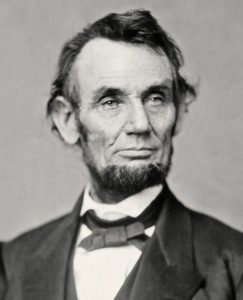
In 1968, Democrat President Lyndon Johnson and a Democrat super majority in Congress adopted the Uniform Monday Holiday Law. They eliminated Washington?s February 22d birthday as a national holiday. They ignored Abraham Lincoln?s February 12th birthday.?? They replaced it with a new ?President?s Day?.
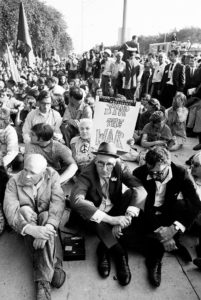
Like most Americans, I didn?t notice it at the time.?? The country was still in shock over the recent murders of Martin Luther King and Robert Kennedy. We were afraid of the Communist trained and inspired radicals who were robbing banks, setting off bombs, murdering police officers, and starting riots that burned and looted stores in dozens of cities. (Later, many of those radicals got jobs in government, colleges, public schools, newspapers, TV, and Hollywood where they now run things.?? Two of them, Bill Ayers and Bernadine Dohrn later became mentors to young Barack Obama.)
The new federal holiday had no theme or purpose other than giving government employees a guaranteed three day weekend in February. However, it did such a good job of erasing George Washington and Abraham Lincoln from our national memory that you have to wonder if that was the intent from the beginning.
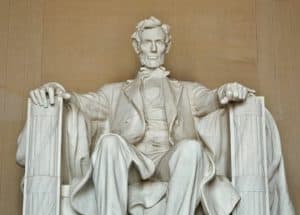
Several years ago, a study by the National Assessment of Educational Progress (NAEP) found that only 9 percent of fourth graders could correctly identify a photograph of Abraham Lincoln and state two reasons for his importance.
This is a tragedy. Every American child should know that Abraham Lincoln was important and why. Like George Washington, Abraham Lincoln is a classic example of how one individual can change the course of history.
Had there been no George Washington or Abraham Lincoln, there would be no United States. Without the United States, there would have been no nation strong enough to defeat the Nazis and Japanese in World War II. Without the United States, the Communist regimes running Russia and China would have quickly dominated the world during the Cold War.
Abraham Lincoln has special importance for Americans today.?? He had a unique understanding and talent for using conservative American traditions to produce revolutionary change.
Although Lincoln was born in 1809 in Indiana, nearly ten years after George Washington died in Virginia, Lincoln is very much a Founding Father. ? He did not write or adopt our Declaration of Independence or Constitution.? However, he had great understanding and respect for the men who did.
He first showed that in 1838, when he gave a speech to the Lyceum, a young people?s social group in his small town.
As a 29 year old lawyer, Lincoln told his generation of young people how lucky they were to be Americans.?? He said we were ?in peaceful possession of the fairest portion of the earth? with ?a system of political institutions? with more ?civil and religious liberty? than any other nation in history.?? However, Lincoln feared that his generation of Americans were in danger of losing everything because they were forgetting the principles of their grandparents’ generation who established our country.
At age 29, Abraham Lincoln was deeply committed to respect for the Constitution and laws of the United States. Lincoln also opposed slavery. ? He believed that the permanent enslavement of blacks in the South (without a Jubilee) was an evil that violated natural law and Biblical law, and that would destroy America if it continued.
This was a big problem for Lincoln. Slavery was permitted by the U.S. Constitution and the laws and state constitutions of the southern states.
Lincoln?s genius was pursuing a consistent and non-violent way to end slavery, while still respecting our Constitution and laws.
Abraham Lincoln believed that America was created by our Declaration of Independence in 1776.?? That document clearly opposes slavery.?? It held these truths to be self-evident: ?All men are all created equal, and endowed by their Creator with certain ?unalienable? rights”.
Lincoln also understood that our Constitution of 1787 originally permitted the enslavement of blacks in certain states.?? How could the two documents be reconciled?
In 1860, after years of struggling with that question, Abraham Lincoln spent months examining letters papers and other documents of the men who framed our Constitution.
After extensive research, Lincoln found that a clear majority of the delegates who framed our Constitution in 1787 opposed slavery, and wrote the Constitution with its ?ultimate extinction? in mind.
For example, most them specifically voted for federal laws that banned slavery in the Northwest Territories in 1787, which ended the ending the importation of new slaves after 20 years.
They also included a mechanism to amend the Constitution to eliminate slavery.?? They only counted a fraction of slaves in the census to reduce the voting power of slave owners in the Electoral College and House of Representatives.
When George Washington was President, slavery was on the verge of disappearing.?? Washington and many founders who owned slaves freed them during their lifetimes or upon their deaths.
Lincoln attracted national attention when he discussed this in detail in a speech at Cooper Union in New York in February of 1860. ? Lincoln spoke of America being founded on the “sentiments” of our Declaration of Independence in his 1861 speech at Independence Hall in Philadelphia in 1861, and at Gettysburg in 1863.? (Four score and seven, or 87 years before 1863 was 1776.)
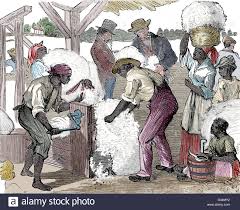
Tragically, the dream of our Founders to end slavery in America collapsed when Eli Whitney invented the cotton gin in 1793.?? This made it possible for cotton farmers to earn obscene profits with slave labor.?? ?Cotton made a poor man rich, and a rich man a king?.? Within a few years, profits from slave produced cotton made Georgia and Mississippi the richest states in the union.?? The good intentions of the Founding Fathers to end slavery were forgotten as Americans in the South rushed to cash in on the cotton boom by buying as much land and slaves as they could with as much money as they could beg, borrow, or steal.
By 1846, most Americans outside the South were alarmed by the rapid expansion of slavery and mobilized to stop it. ?In 1846, Abraham Lincoln, then a 37 year old Congressman opposed the war against Mexico as an unjust scheme to grab more land for cotton and slave owners.
Lincoln knew that opponents of slavery could not legally and constitutionally end slavery in the South.?? .He did not support revolutions or slave rebellions in the southern states.
However, Lincoln did oppose the expansion of slavery into new territories like Kansas and Nebraska.?? He opposed the Dred Scott decision of the Supreme Court which allowed southerners to bring their slaves with them in and out of any non-slave state or territory they wanted. In 1854, ?Lincoln also helped form the Republican Party to support these policies of containment.
Abraham Lincoln knew that containment of slavery meant ending slavery.?? That is because cotton was a greedy crop that robbed the soil of nutrients.?? Cotton growers had to constantly buy new land and clear new fields to stay in business.
Southern leaders agreed with Lincoln.?? They also knew that slavery would die out if it did not expand.?? When Lincoln was elected President and Republicans took control of both houses of Congress in 1860, the legislatures of eleven of the fifteen slave states immediately adopted resolutions stating that their states were no longer part of the United States.
At this point, neither Abraham Lincoln nor Congress? had any power under the Constitution to free any slaves.? Slaves were property, and the 5th Amendment barred the Federal government from taking any property “without due process of law” except for “public use” with “just compensation”.
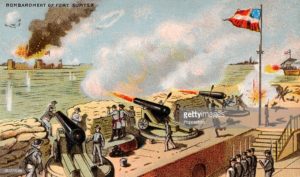
However, in April 1861, the South Carolina militia opened fire on federal soldiers on Fort Sumpter outside of Charleston.?? That began the Civil War.?? That war gave Union soldiers and President Lincoln, their commander-in-chief, the Constitutional right to free slaves.
Under military law, soldiers can seize ?contraband? or property used by enemy soldiers. Since the Confederate Army used black slaves to bring them food, ammunition, and equipment, President Abraham Lincoln for the first time had the power under military law to ?seize? those slaves as ?contraband of war? and then free them.
Abraham Lincoln and more than 300,000 mostly white American men died in the Civil War to end the enslavement of blacks in the southern states.
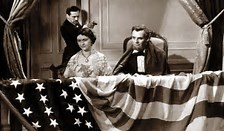
John Wilkes Booth, an actor and a Democrat murdered Lincoln in 1865 at the end of the Civil War. ? Booth did that for a very practical and political reason.?? He knew that Lincoln had picked Andrew Johnson, a racist Democrat, to be his Vice-President in the close 1864 election to win Democrat votes.?? Booth also correctly predicted that if Johnson became President, he would work with Southern Democrats to block Republican efforts to recognize and protect the rights of freed black slaves in the South. Unfortunately,? Booth was right.? For the next four years, Democratic President Andrew Johnson did empowered white southern Democrats and their terrorist organization, the Ku Klux Klan. He effectively stripped freed blacks in the South of all of the basic rights promised by Lincoln and Republicans. ? He evicted freed black slaves blacks from lands they had improved in South Carolina. ? Those lands had been abandoned by Confederate rebels and deeded to freed black slaves by General Sherman under a plan approved by President Lincoln and other Republican leaders.
Republicans tried to impeach Johnson and remove him from office.? However, they failed by a single vote in the Senate. Republicans took back the White House in 1868 with the election of former Union Army Commander Ulysses S. Grant.?? For the next eight years Republican President Grant used the full power of the Union Army to fight the KKK and protect the rights of freed black slaves in the South.?? However, by that time, white Democrats and the KKK had become too strong. ? White Southern Democrats took complete control of all former slave states when Grant?s term expired in 1877, and kept that control for the next 90 years.
If more Americans knew the story of Abraham Lincoln, they would understand and appreciate the greatness of America.?? This may explain why his story is no longer told in most schools and colleges today.
TAG LINE:?? Seth Grossman is a Somers Point attorney and executive director of LibertyAndProsperity.com.?? It holds breakfast discussions 9:30 am every Saturday at the Shore Diner in Egg Harbor Township by Parkway Exit 36. Seth Grossman can be reached at info@libertyandprosperity.com.

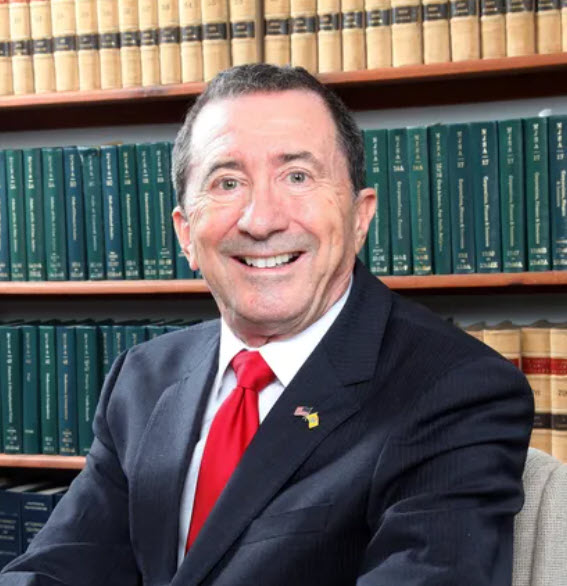
?Islam is a cancer?-verbatim Seth Grossman quote
Yes, I posted that comment in 2016 to describe the total lack of condemnation, repudiation, or even concern by Islamic leaders for the calculated and brutal murder of a moderate Muslim shopkeeper in Glasgow, Scotland for wishing his non-Muslim friends “Happy Christmas” and “Happy Easter” on Facebook. I agree I should have used different words. However, the words I used were certainly less offensive than silence in the face of such an outrage. Here is one of many links to the incident. https://www.theguardian.com/uk-news/2016/aug/09/tanveer-ahmed-jailed-for-murder-glasgow-shopkeeper-in-sectarian-attack. By the way, the shopkeeper never claimed he was a prophet. However, his murderer accused the shopkeeper of claiming to be a prophet because shopkeeper openly said it was OK for Muslims to be friends with non-Muslims and respect the non-Muslim customs of Britain–things specifically forbidden by “the Last Prophet”. Seth Grossman